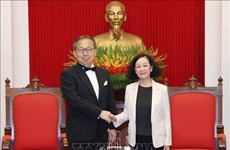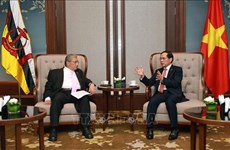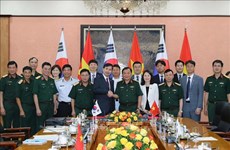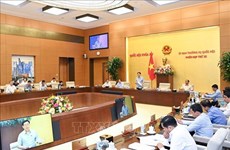PM gives answers to hot issues
PM Nguyen Tan Dung provided
lawmakers with explanations for a host of issues that have generated
voters’ concern, as well as the moves the Government will take to handle
them, at a live broadcast session on Nov. 24.
Prime Minister Nguyen Tan Dung provided
lawmakers with explanations for a host of issues that have generated
voters’ concern, as well as the moves the Government will take to handle
them, at a live broadcast session on Nov. 24.
Dealing with rising consumer prices and inflation in the year-end months, PM Dung said the Government will focus on facilitating production and business activities by clearing difficulties and hindrances.
It will prioritise resources for flood-hit localities, to restore production as quickly as possible and ensure the immediate circulation and supply of commodities for local people, he said.
“The Government will stabilise the prices of input commodities and fundamental services of the national economy, like power, coal, cement, paper, and fertiliser,” PM Dung said in his report.
He said the Government will utilise tax tools, fees and the price stabilising fund to keep the petrol price at a reasonable level and use financial and monetary tools in a flexible manner in line with the market mechanism to meet producer and business needs for capital while ensuring the liquidity of the banking system and the entire national economy.
“The Government will concentrate on instructing the simultaneous employment of these solutions to control prices, especially during the traditional lunar New Year festival (Tet),” PM Dung said.
By the end of November, the consumer price index registered at 9.58 percent increase compared to December last year.
Touching on the country’s bauxite processing project, the PM said that the exploration, exploitation and processing of bauxite have been a consistent goal the Party has pursued from its IXth National Congress, since the country’s reserves of bauxite – from which aluminium is produced – are estimated at 11 billion tonnes, mostly in the Central Highlands.
He made clear that in their related policies and instructions, the Party Politburo and Central Committee and the National Assembly have all underscored that the bauxite exploitation and processing go along with developing the aluminum industry, aiming to serve the country’s economic growth and promote the Central Highlands’ socio-economic development.
Regarding the issue, the Government assigned the Coal and Mineral Industry Group to carry out on a trial basis two bauxite exploitation and processing projects in Tan Rai and Nhan Co in Lam Dong and Dak Nong provinces, PM Dung told the deputies, noting that the development, examination and approval of these projects had been conducted in line with the Party’s guidance and State law and had strong support from localities that will benefit from the projects.
The appraisal councils established by the Ministry of Industry and Trade and the Ministry of Natural Resources and Environment confirmed that, “These projects will bring about social and economical benefits and ensure safety in terms of the environment, security and defence,” he said.
Turning to the restructuring of the Vietnam Shipbuilding Industry Corporation (Vinashin), which was hard hit by financial problems, PM Dung firstly mentioned its achievements in the 1996-2008 period, including an annual average growth rate of 35-40 percent. He cited independent auditing reports that put the group’s pre-tax profits at 126.5 billion VND in 2005, 503.3 billion VND in 2006, 858.8 billion VND in 2007 and 645.1 billion VND in 2008, and its contribution of over 3.3 trillion VND to the State budget by the end of 2009.
By early 2009, Vinashin received orders worth nearly 12 billion USD and it built and handed over 279 ships worth more than 1.8 billion USD, including 155 ships valued at 1.1 billion USD that were exported.
However, the shipbuilder made losses worth 1.6 trillion VND in 2009 after struggling with impacts of the global financial crisis and economic recession, and mainly the wrongdoings, dishonest reports and weaknesses in business administration, financial and investment management committed by its leadership, PM Dung said.
He also attributed the losses to a number of responsible Governmental agencies and their failure to perform their state management duties, as well as State ownership of the corporation.
Dealing with the situation, PM Dung said he requested that relevant ministries join in monitoring and helping Vinashin to maintain its production and business. He also requested Vinashin cut investments in ineffective projects.
PM Dung recalled that in July, 2009, he established an inter-branch working group to study a plan to restructure the group.
At present, the Government’s inspectors are completing reports on their overall examinations of Vinashin while independent auditors are auditing the group’s business outcomes in 2010 and the group’s leaders are screening the group’s financial capability and assets in order to provide updated statistics in those areas.
A steering committee for Vinashin restructuring was also set up headed by Permanent Deputy Prime Minister Nguyen Sinh Hung.
Most recently, on Nov. 18, the PM approved the Vinashin restructuring plan which aimed to help the group stabilise its production and business, strengthen its prestige and trademark, pay off its debts step by step, and grow to become the core of the shipbuilding industry and a spearhead in promoting the maritime economy and implementing the national sea strategy.
In his report, PM Dung also referred to the Government’s instructions and efforts made by the power sector in ensuring the supply of power for production and the people’s needs.
According to the PM, close to 98 percent of communes and 95.4 percent of rural households nationwide have so far had access to the national power grid, surpassing the goals set forth in the Party’s Xth Congress by 5.4 percent.
Talking about the fight against storms and floods, PM Dung underscored the urgent need for making action plans to deal with climate change, sea level rise and flooding, after recalling the heavy loss of life and property caused by torrential rains in the central region.
At present, ministries, sectors and localities are working on their own action plans for combating climate change, to prepare for the formulation of the national action plan in the field, PM Dung told the deputies.
The Government has signed an agreement with the Dutch government regarding the latter’s assistance in planning irrigation facilities in the Mekong and Hong ( Red river ) deltas to fight climate change and sea level rise.
Projects to strengthen sea and river dykes have been carried out after getting the PM’s approval, he said.
In his report, PM Dung affirmed that the Government continues to prioritise investments for the development of agriculture and rural areas by adopting an action programme to implement the seventh Party Central Committee resolution on agriculture, farmers and rural areas, tasking ministries, branches and localities to carry out related programmes and projects, and encouraging enterprises from all economic sectors to invest in the fields.
In the 2004-2008 period before the seventh Party Central Committee resolution, the Government allocated more than 181 trillion VND, or 39.1 percent of the State budget’s development capital and Government bonds, for agriculture and rural areas.
For their part, localities have been proactive in making their own programmes to implement the resolution on agriculture and rural areas.
Dealing with rising consumer prices and inflation in the year-end months, PM Dung said the Government will focus on facilitating production and business activities by clearing difficulties and hindrances.
It will prioritise resources for flood-hit localities, to restore production as quickly as possible and ensure the immediate circulation and supply of commodities for local people, he said.
“The Government will stabilise the prices of input commodities and fundamental services of the national economy, like power, coal, cement, paper, and fertiliser,” PM Dung said in his report.
He said the Government will utilise tax tools, fees and the price stabilising fund to keep the petrol price at a reasonable level and use financial and monetary tools in a flexible manner in line with the market mechanism to meet producer and business needs for capital while ensuring the liquidity of the banking system and the entire national economy.
“The Government will concentrate on instructing the simultaneous employment of these solutions to control prices, especially during the traditional lunar New Year festival (Tet),” PM Dung said.
By the end of November, the consumer price index registered at 9.58 percent increase compared to December last year.
Touching on the country’s bauxite processing project, the PM said that the exploration, exploitation and processing of bauxite have been a consistent goal the Party has pursued from its IXth National Congress, since the country’s reserves of bauxite – from which aluminium is produced – are estimated at 11 billion tonnes, mostly in the Central Highlands.
He made clear that in their related policies and instructions, the Party Politburo and Central Committee and the National Assembly have all underscored that the bauxite exploitation and processing go along with developing the aluminum industry, aiming to serve the country’s economic growth and promote the Central Highlands’ socio-economic development.
Regarding the issue, the Government assigned the Coal and Mineral Industry Group to carry out on a trial basis two bauxite exploitation and processing projects in Tan Rai and Nhan Co in Lam Dong and Dak Nong provinces, PM Dung told the deputies, noting that the development, examination and approval of these projects had been conducted in line with the Party’s guidance and State law and had strong support from localities that will benefit from the projects.
The appraisal councils established by the Ministry of Industry and Trade and the Ministry of Natural Resources and Environment confirmed that, “These projects will bring about social and economical benefits and ensure safety in terms of the environment, security and defence,” he said.
Turning to the restructuring of the Vietnam Shipbuilding Industry Corporation (Vinashin), which was hard hit by financial problems, PM Dung firstly mentioned its achievements in the 1996-2008 period, including an annual average growth rate of 35-40 percent. He cited independent auditing reports that put the group’s pre-tax profits at 126.5 billion VND in 2005, 503.3 billion VND in 2006, 858.8 billion VND in 2007 and 645.1 billion VND in 2008, and its contribution of over 3.3 trillion VND to the State budget by the end of 2009.
By early 2009, Vinashin received orders worth nearly 12 billion USD and it built and handed over 279 ships worth more than 1.8 billion USD, including 155 ships valued at 1.1 billion USD that were exported.
However, the shipbuilder made losses worth 1.6 trillion VND in 2009 after struggling with impacts of the global financial crisis and economic recession, and mainly the wrongdoings, dishonest reports and weaknesses in business administration, financial and investment management committed by its leadership, PM Dung said.
He also attributed the losses to a number of responsible Governmental agencies and their failure to perform their state management duties, as well as State ownership of the corporation.
Dealing with the situation, PM Dung said he requested that relevant ministries join in monitoring and helping Vinashin to maintain its production and business. He also requested Vinashin cut investments in ineffective projects.
PM Dung recalled that in July, 2009, he established an inter-branch working group to study a plan to restructure the group.
At present, the Government’s inspectors are completing reports on their overall examinations of Vinashin while independent auditors are auditing the group’s business outcomes in 2010 and the group’s leaders are screening the group’s financial capability and assets in order to provide updated statistics in those areas.
A steering committee for Vinashin restructuring was also set up headed by Permanent Deputy Prime Minister Nguyen Sinh Hung.
Most recently, on Nov. 18, the PM approved the Vinashin restructuring plan which aimed to help the group stabilise its production and business, strengthen its prestige and trademark, pay off its debts step by step, and grow to become the core of the shipbuilding industry and a spearhead in promoting the maritime economy and implementing the national sea strategy.
In his report, PM Dung also referred to the Government’s instructions and efforts made by the power sector in ensuring the supply of power for production and the people’s needs.
According to the PM, close to 98 percent of communes and 95.4 percent of rural households nationwide have so far had access to the national power grid, surpassing the goals set forth in the Party’s Xth Congress by 5.4 percent.
Talking about the fight against storms and floods, PM Dung underscored the urgent need for making action plans to deal with climate change, sea level rise and flooding, after recalling the heavy loss of life and property caused by torrential rains in the central region.
At present, ministries, sectors and localities are working on their own action plans for combating climate change, to prepare for the formulation of the national action plan in the field, PM Dung told the deputies.
The Government has signed an agreement with the Dutch government regarding the latter’s assistance in planning irrigation facilities in the Mekong and Hong ( Red river ) deltas to fight climate change and sea level rise.
Projects to strengthen sea and river dykes have been carried out after getting the PM’s approval, he said.
In his report, PM Dung affirmed that the Government continues to prioritise investments for the development of agriculture and rural areas by adopting an action programme to implement the seventh Party Central Committee resolution on agriculture, farmers and rural areas, tasking ministries, branches and localities to carry out related programmes and projects, and encouraging enterprises from all economic sectors to invest in the fields.
In the 2004-2008 period before the seventh Party Central Committee resolution, the Government allocated more than 181 trillion VND, or 39.1 percent of the State budget’s development capital and Government bonds, for agriculture and rural areas.
For their part, localities have been proactive in making their own programmes to implement the resolution on agriculture and rural areas.













